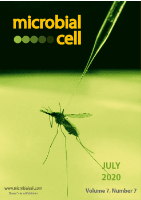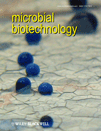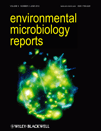
npj Biofilms and Microbiomes
Scope & Guideline
Fostering Collaboration in the Study of Biofilms and Microbiomes
Introduction
Aims and Scopes
- Microbial Dynamics and Interactions:
The journal emphasizes the study of microbial interactions within biofilms and their ecological implications, exploring how these communities form, evolve, and function in various environments. - Health and Disease Associations:
Research often investigates the role of microbiomes in human health and disease, including gut microbiota's influence on metabolic disorders, immune responses, and disease susceptibility. - Environmental Microbiology:
The journal publishes studies on microbial communities in environmental contexts, including their roles in nutrient cycling, pollutant degradation, and ecosystem stability. - Innovative Therapeutic Approaches:
There is a focus on developing novel strategies for manipulating microbiomes and biofilms for therapeutic purposes, such as probiotic treatments, antimicrobial strategies, and bioengineering applications. - Technological Advancements in Microbial Research:
Research utilizing cutting-edge technologies such as metagenomics, proteomics, and bioinformatics to unravel the complexities of microbial communities and their functionalities.
Trending and Emerging
- Microbiome and Host Interactions:
There is an increasing focus on understanding how microbiomes interact with their hosts, influencing health outcomes, immune responses, and metabolic processes. - Machine Learning and AI in Microbiology:
The application of machine learning and artificial intelligence for analyzing microbiome data is on the rise, enabling more sophisticated modeling of microbial dynamics and interactions. - Environmental and Ecological Impacts of Microbiomes:
Research is expanding to explore the ecological roles of microbiomes in diverse environments, including their effects on ecosystem health, resilience, and climate change. - Therapeutic Manipulation of Microbiomes:
Innovations in microbiome manipulation, such as fecal microbiota transplantation and engineered probiotics, are emerging themes, reflecting a growing interest in therapeutic applications. - Biofilm Dynamics and Control Strategies:
There is a notable trend towards studying the dynamics of biofilm formation and persistence, particularly in relation to developing novel strategies for biofilm control in clinical and industrial settings.
Declining or Waning
- Traditional Antibiotic Resistance Studies:
Research focused solely on antibiotic resistance mechanisms in isolation is becoming less prevalent, as there is a growing emphasis on understanding the complex interactions within microbial communities that contribute to resistance. - Single-Species Biofilm Studies:
There is a noticeable decrease in studies examining single-species biofilms, as research increasingly focuses on multi-species interactions and their ecological consequences. - Basic Microbial Taxonomy:
Studies that primarily focus on cataloging microbial species without exploring their functional roles or interactions within ecosystems are becoming less common, reflecting a shift towards functional and ecological research.
Similar Journals

Microbial Cell
Fostering collaboration in microbial research.Microbial Cell is a distinguished open-access journal published by SHARED SCIENCE PUBLISHERS OG, focusing on the dynamic fields of microbiology, biochemistry, and molecular biology. Since its establishment in 2014, Microbial Cell has been at the forefront of disseminating cutting-edge research essential for advancing our understanding of microbial functions and interactions. With a commendable impact factor and ranking in the top quartiles (Q1 and Q2) across several categories, including Applied Microbiology and Biotechnology and Parasitology, this journal serves as an invaluable resource for researchers, professionals, and students alike. It features a comprehensive scope that encompasses the latest findings in genetics, cell biology, and virology, facilitating the academic community's access to high-quality peer-reviewed work. Microbial Cell not only contributes to advancing microbial sciences but also fosters an inclusive platform for knowledge sharing and collaboration in the scientific community.

MICROBIAL ECOLOGY
Illuminating the intricate web of microbial life.MICROBIAL ECOLOGY, published by Springer, is a premier journal dedicated to advancing the field of microbial ecology, illuminating the intricate relationships between microorganisms and their environments. Established in 1974, the journal reflects a strong historical commitment to disseminating high-quality research, with its current scope encompassing groundbreaking studies that explore microbial dynamics in various ecosystems. In the 2023 rankings, it has secured a prestigious position in Q1 across multiple categories, including Ecology, Evolution, Behavior and Systematics, and Soil Science, indicating its influential contribution to scientific literature. While it does not offer Open Access, the journal remains highly accessible to researchers and professionals via institutional subscriptions. With an impressive Scopus ranking across significant ecological categories, it serves as an essential resource for academics looking to deepen their understanding of microbial interactions and ecological processes, thereby facilitating innovative research and practical applications in environmental science.

Microbial Biotechnology
Driving excellence in microbial research and technology.Microbial Biotechnology, published by WILEY, stands at the forefront of innovation in the field of applied microbiology and biotechnology, showcasing cutting-edge research and advancements within both academic and industrial contexts. As an Open Access journal since 2012, it ensures that high-quality research is easily accessible to researchers, professionals, and students globally, promoting knowledge sharing and collaboration. With an impressive impact, the journal holds a Q1 ranking in its categories—Applied Microbiology and Biotechnology, Biochemistry, Bioengineering, and Biotechnology—demonstrating its significance in the scientific community. The journal currently boasts a strong Scopus ranking in several relevant disciplines, including a top 10% position in Applied Microbiology and Biotechnology, highlighting its critical role in disseminating influential findings. Designed to foster dialogue and advance technology within the microbial sciences, Microbial Biotechnology is an essential resource for anyone committed to leveraging microbial processes for sustainable and innovative solutions.

Gut Pathogens
Navigating the Complexities of Gut Pathogens for a Healthier FutureGut Pathogens, published by BMC in the United Kingdom, is a premier open-access journal focusing on the intersection of gut health and infectious diseases. With its impact firmly established since its inception in 2009, the journal has earned impressive rankings, including Q1 in renowned categories such as Gastroenterology, Infectious Diseases, Microbiology, and Parasitology, while maintaining a strong presence in Virology. The journal serves as a vital resource for researchers, professionals, and students interested in the intricate relationships between gut microbiota and pathogenic organisms, offering insights that drive advancements in treatment and prevention strategies. By providing unrestricted access to high-quality research, Gut Pathogens fosters a collaborative environment, encouraging the dissemination of knowledge and innovation within the field. The journal publishes original research, reviews, and case studies, all designed to address contemporary challenges in gut health, ultimately aiming to improve patient outcomes and public health worldwide.

Environmental Microbiology Reports
Unveiling the Hidden Roles of Microorganisms in EcosystemsEnvironmental Microbiology Reports, published by WILEY, is a prestigious journal dedicated to the field of environmental microbiology, exploring the intricate interactions between microorganisms and their environments. With an ISSN of 1758-2229, this journal has established itself as a crucial resource for researchers, professionals, and students interested in the latest advancements and applications in microbial ecology, soil science, and environmental sustainability. Since its inception in 2009, the journal has grown in impact and reputation, proudly ranked in the Q1 category for both Agricultural and Biological Sciences and Ecology, Evolution, Behavior and Systematics as of 2023. Notably, it occupies the 17th position out of 193 in its subcategory based on Scopus rankings, showcasing its significance within the field. Although it does not currently offer open access options, the high-quality research published in this journal continues to contribute significantly to the understanding of microbial roles in environmental processes, emphasizing the vital role of microbes in maintaining ecosystem health and promoting sustainable practices.

Soil Ecology Letters
Unlocking the Secrets of Soil EcosystemsSoil Ecology Letters, published by SpringerNature, is a premier journal dedicated to advancing the knowledge and understanding of soil ecosystems, their functions, and their vital role in global sustainability. Since its inception in 2019, this leading journal has consistently maintained its prestigious Q1 ranking in Ecology, Evolution, Behavior and Systematics, as well as Soil Science, reflecting its significant impact in the ecological and environmental sciences community. With an impressive Scopus ranking that places it within the top percentile of journals in its field, Soil Ecology Letters provides a platform for researchers and professionals to disseminate their groundbreaking findings. The journal is a vital resource for advancing research in agricultural and biological sciences, offering open access options that promote widespread dissemination of knowledge. With its focus on fostering collaboration and innovation in soil ecology, this journal is essential reading for anyone aiming to deepen their understanding of soil environments and their critical role in ecological health.

Frontiers in Microbiology
Shaping the Future of Microbial SciencesFrontiers in Microbiology is a leading open-access journal published by Frontiers Media SA, available since 2010, and based in Switzerland. As a prominent platform for innovative research, it specializes in microbiology and medical microbiology, marked by its impressive Q1 classification in the respective fields, reflecting its significant impact and relevance in advancing microbial sciences. With a Scopus ranking of 49th in Microbiology and 41st in Medical Microbiology, this journal is positioned among the top-tier publications, catering to a diverse audience of researchers, professionals, and students. The journal aims to disseminate groundbreaking findings and foster discussions that drive the field forward, ensuring a comprehensive coverage of microbiological studies, from basic research to applications in healthcare and beyond. Enjoy unrestricted access to cutting-edge articles that contribute to both theoretical and applied aspects of microbiology, enriching the scientific community's knowledge base.

Microorganisms
Innovating discoveries in microbiology and virology.Microorganisms is a leading open-access journal published by MDPI based in Switzerland, catering specifically to the rapidly evolving fields of microbiology and virology. Since its inception in 2013, the journal aims to foster the dissemination of high-quality research through its comprehensive and interdisciplinary platform, with a particular focus on both fundamental and applied microbiological sciences. Contributing to its esteemed reputation, Microorganisms holds a commendable Q2 ranking in the categories of Microbiology and Virology, as well as in Medical Microbiology, highlighting its significance in the academic community. With a consistent impact, evidenced by its rankings in Scopus—such as rank #25 in Virology and #56 in Microbiology—the journal serves as an invaluable resource for researchers, professionals, and students looking to stay at the forefront of microbiological research. As an open-access journal, Microorganisms ensures that vital research findings are readily available to a global audience, promoting collaboration and innovation in the study of microbial life and its implications for health and disease.

Tropics
Connecting scholars to the heart of tropical ecology.Tropics, published by the Japan Society for Tropical Ecology, is a prominent journal dedicated to advancing the field of tropical ecology, conservation, and environmental science. With an ISSN of 0917-415X and E-ISSN of 1882-5729, this journal has become a vital resource for researchers, professionals, and students interested in the intricate dynamics of tropical ecosystems. Although it operates as a non-open access publication, it continues to foster academic discourse and collaboration, evident from its various Scopus rankings across categories such as Environmental Science and Agricultural and Biological Sciences. As of 2023, Tropics stands resilient in its mission, providing invaluable insights, promoting sustainable practices, and addressing pressing ecological challenges within tropical environments. The journal’s contributions have been acknowledged since its inception in 1997, making it an essential part of the scientific literature landscape and a key player in supporting tropical ecological research.

WATER SCIENCE AND TECHNOLOGY
Advancing sustainable solutions for a vital resource.WATER SCIENCE AND TECHNOLOGY, published by IWA PUBLISHING, is a leading academic journal dedicated to advancing the field of water science and technology. With a rich history dating back to 1970, the journal provides a platform for innovative research and technological advancements, catering to the vital challenges faced within the realms of environmental engineering and water resource management. As evidenced by its strong ranking in Scopus, where it holds a position of #86 in Water Science and Technology and #77 in Environmental Engineering, the journal exemplifies significant scholarly contributions, reflected in its Q2 quartile status in both categories as of 2023. Although not an open access journal, WATER SCIENCE AND TECHNOLOGY ensures that its articles are widely available to researchers, professionals, and students passionate about sustainable water solutions. With a continued commitment to excellence, this journal plays a crucial role in shaping the discourse surrounding water quality, conservation, and technology innovation, making it an essential resource for all stakeholders in this critical field.